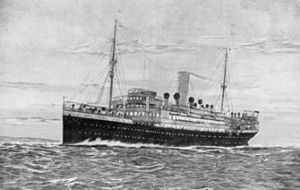MercoPress. South Atlantic News Agency
“Little-known stories” about 1914 are myths
 German steamer Seydlitz built in 1903, she could carry 1900 passengers.
German steamer Seydlitz built in 1903, she could carry 1900 passengers. Last week’s Penguin News carried an article by John Fowler, “War veteran publishes little known stories”, about the account by Colonel Tamaño entitled “Historias poco conocidas: Un ferrocarril en las Malvinas” [“Little-known stories: A railway in the Malvinas”], published recently on the Argentine army website soldadosdigital.com.
Tamaño’s description of the Camber railway and his experiences of the Falklands War are interesting, but most of what he says about the Battle of the Falklands in 1914 consists of myths which should be laid to rest.
The first myth is that the German steamer Seydlitz was waiting to bring German volunteers from Chile to garrison Stanley after capture by the Germans. In fact Seydlitz carried supplies, but no volunteers at all. The second myth is that Admiral von Spee intended to capture the Falklands – in fact he intended only a hit-and-run raid. On the morning of 8 December 1914 he detached the armoured cruiser Gneisenau and the light cruiser Nürnberg to carry out a lightning attack on Stanley, while his flagship, the armoured cruiser Scharnhorst, remained on the horizon to the east with the light cruisers Leipzig and Dresden. Nürnberg was to enter Stanley harbour and destroy British stores and equipment; Gneisenau was to anchor at the Narrows and send armed cutters to the town under Sub-Lieutenant Kotthaus, who was to attempt to capture the Governor (William Allardyce). The Germans were not planning to stay in the islands at all – von Spee had ordered Gneisenau and Nürnberg to rejoin the other ships on the evening of the same day. His plan was then simply to return to Germany, but he never made it of course, as we all know.
The third myth from Tamaño, that there was a German plan to hand the Falklands to Argentina, is a completely crackpot notion. It was first mentioned by José Luis Muñoz Azpiri in Historia Completa de las Malvinas, Buenos Aires 1966, vol. 1 p. 425-426, quoting a letter sent to him on 4 June 1953 by Argentine diplomat Adolfo Blanc, asserting that von Spee had received orders from the German admiralty and foreign ministry to proclaim Argentine sovereignty over the Falklands. Neither Muñoz Azpiri nor Tamaño gives any original source; the whole thing is a typical example of the wishful thinking that arose in Argentina through the heavy indoctrination about the Falklands initiated by Perón.
In fact the Falklands issue was largely dormant in the First World War; the plan to raid the islands was von Spee’s own, and the German government knew nothing about it. It was opposed by some of his captains including Julius Maerker of Gneisenau – in his last signal to Maerker von Spee said “You were right after all”, graciously conceding he had been wrong to attack the Falklands. In any case, no Argentine government would have been mad enough to accept a “present” of British territory seized by Germany – Argentina would at once have lost its neutrality and faced a declaration of war by Britain and all the Allies. The only way for Germany to hand the Falklands to Argentina would have been to win the war, after which British territories could have been handed out freely – and to do that, it would not have been necessary to attack the islands themselves. As for the Seydlitz, Captain Leuss escaped after the battle by steaming south at full speed, but ran out of coal and anchored at San Antonio on the Argentine coast. Argentina then interned the ship and her crew for the duration of the war (so much for Argentine cooperation with Germany).
The revival of those myths by Colonel Tamaño does the history of the Falklands a disservice.
By Dr. Graham Pascoe - English language lecturer in Munich, has studied Falklands history for many years




Top Comments
Disclaimer & comment rules-

Read all commentsThis retractation from mercopress is as unsubstained as the previous one.
Jun 03rd, 2009 - 11:33 pm 0I still dont underestand what proof they have that the germans did wanted to take malvinas for the argentines or that they didnt.
Commenting for this story is now closed.
If you have a Facebook account, become a fan and comment on our Facebook Page!